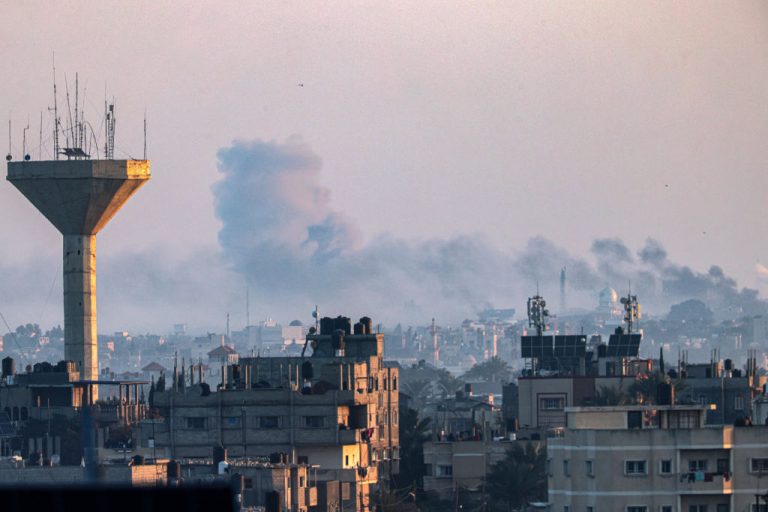As the United States and Israel rush to develop their post-war plan for Gaza, which may include the Palestinian Authority, senior Palestinian leaders are moving to build a unified position.
The war waged by Israel on the Gaza Strip has led to the killing of more than 24,000 Palestinians so far, 70% of whom are women and children. [Getty]
A Palestine Liberation Organization official confirmed that managing the Gaza Strip after the current Israeli war is an “internal Palestinian issue.” The New Arab On Tuesday, January 16th.
Ramzi Rabah, a member of the Executive Committee of the Palestine Liberation Organization and representative of the Democratic Front for the Liberation of Palestine, said, “The future of the Gaza Strip will be determined by the Palestinian people through the leadership of national unity, and not American and Israeli plans.”
Rabah said: “Israel is looking for a formula for cooperative administration in the Gaza Strip, which even the Palestinian Authority considers unfit for it, and we categorically reject this project.”
He added, “The dialogue is open between all Palestinian political forces to form a national unity leadership to manage the repercussions of the war.”
On Monday, Rabah, along with other members of the PLO Executive Committee, participated in a press conference on local Watan Radio in Ramallah, calling for a “unified Palestinian position” to “confront the American project ‘The Day After’ in Gaza.”
The initiative of PLO officials called for “the formation of a national unity government” and “an urgent meeting of the secretaries-general of the Palestinian factions.”
Earlier in November, Palestinian President Mahmoud Abbas said that the Palestinian Authority could only play a role in managing the Gaza Strip in the context of a comprehensive solution to the conflict.
Abbas's statements came during a meeting in Ramallah with US Secretary of State Anthony Blinken, where they discussed the repercussions of the war. The US State Department stated that Blinken pushed for reform in the Palestinian Authority to enable it to manage Gaza after the war during his meeting with Abbas.
Blinken reportedly discussed the role of the Palestinian Authority in Gaza after the war during his final meeting with Abbas last week.
Rabah said, “The American attempt is to separate the post-war period from the real political issue, which is ending the occupation as a path to resolving the conflict.”
He added: “This is why we need a unified position that leads to a unified leadership that can bear responsibility for the entire Palestinian territories, including the effects of the war in Gaza.”
He pointed out, “This requires the participation of both poles of the Palestinian political division, and we are in an open dialogue with all political factions that agree on the necessity of unifying the Palestinian voice, including Fatah and Hamas.”
Earlier this month, Palestinian President spokesman Nabil Abu Rudeina said, “The future of the Palestinian territories in the Gaza Strip and the West Bank, including East Jerusalem, will be decided solely by the Palestinian people and not the occupation.” Or any external party.
Abu Rudeina's statements came as part of a statement in which he accused Israel of “silent annexation” of the occupied West Bank through settlement expansion.
A member of the Hamas political bureau and a prominent leader, Ghazi Hamad, said today, Monday, in a televised interview with the Egyptian On channel, that “Hamas is ready to hand over the administration of Gaza to a national unity government,” stressing that “the government’s rule” of the Gaza Strip must be through consensus. “Palestinian.”
Meanwhile, Israel continues its war on the Gaza Strip for the 102nd day, as the Palestinian Ministry of Health announced that the Israeli war on Gaza led to the killing of more than 24 thousand Palestinians, two-thirds of whom were women and children.

